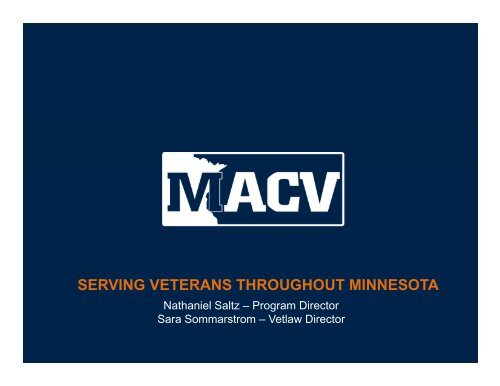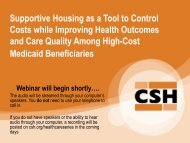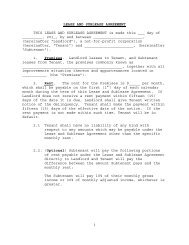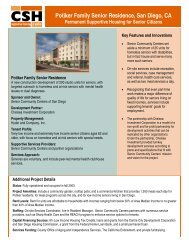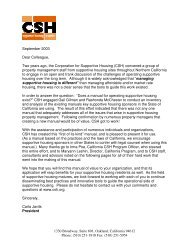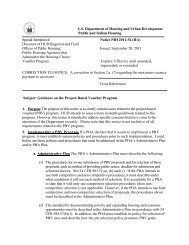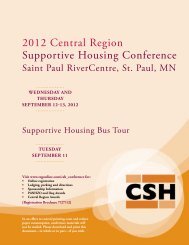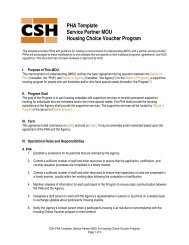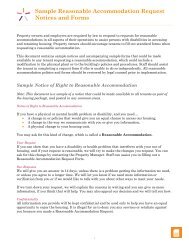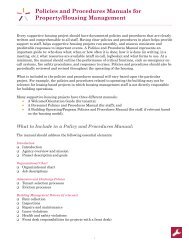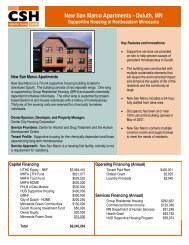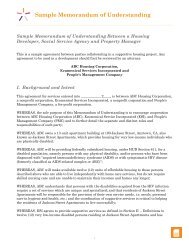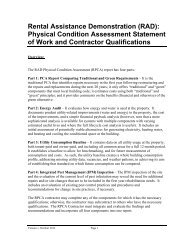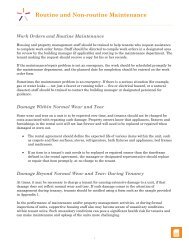Homelessness Among Veterans - Corporation for Supportive Housing
Homelessness Among Veterans - Corporation for Supportive Housing
Homelessness Among Veterans - Corporation for Supportive Housing
Create successful ePaper yourself
Turn your PDF publications into a flip-book with our unique Google optimized e-Paper software.
SERVING VETERANS THROUGHOUT MINNESOTA<br />
Nathaniel Saltz – Program Director<br />
Sara Sommarstrom – Vetlaw Director
Ending <strong>Homelessness</strong> <strong>Among</strong><br />
<strong>Veterans</strong>
A VETERAN<br />
DEFINED….<br />
Principled Uprightness of Character<br />
Principled Uprightness of Character<br />
Personal Integrity<br />
Honor<br />
Sacrifice
MACV Mission: To provide assistance throughout<br />
Minnesota to positively motivated veterans and their<br />
families who are homeless or experiencing other life crises.<br />
MACV accomplishes this by providing direct services or by<br />
collaborating with other agencies/providers.<br />
MACV Vision To be an enthusiastic, proactive<br />
champion and national leader creating and supporting<br />
alliances and partnerships to assist veterans who are<br />
threatened with or experiencing homelessness.
About MACV<br />
501(c)(3) Nonprofit<br />
Established 1990<br />
Operates 3 Regional Offices <strong>for</strong><br />
statewide outreach: Mankato, Duluth,<br />
and the Twin Cities Metro;<br />
Headquarters in St. Paul.<br />
Certified by Minnesota Charities<br />
Review Council &<br />
Better Business Bureau<br />
Audited ANNUALLY and throughout<br />
the year by specific funders
MACV Locations:<br />
St. Paul Headquarters:<br />
360 Robert Street North<br />
Suite 306<br />
St. Paul, MN 55101<br />
MACV-Duluth<br />
5209 Ramsey Street<br />
Duluth, MN 55807<br />
MACV-Metro:<br />
One <strong>Veterans</strong> Drive<br />
VAHCS Building 47<br />
Minneapolis, MN 55417<br />
MACV-Mankato<br />
12 Civic Center Plaza, Suite 1615<br />
Mankato, MN 56011
VA BENEFITS<br />
Health Care<br />
Research<br />
Disabilities and Pensions<br />
Home Loan Guarantees<br />
Memorial Affairs<br />
– National Cemetery<br />
VETERANS ADMINISTRATION<br />
VHA –<strong>Veterans</strong> Health Care<br />
VBA –<strong>Veterans</strong> Benefits
MILITARY AND VETERANS<br />
NO SAFE PLACE – NO SAFE ROLE<br />
Operation Enduring Freedom (OEF)<br />
Operation Iraqi Freedom (OIF)<br />
Operation New Dawn (OND)
National Findings (OEF/OIF)<br />
Approximately 1.7 million have deployed since 2001<br />
34% have deployed multiple times<br />
28% are National Guard or Reservists (average age is 36 years old)<br />
46% of Regular Forces are under 25 years old; <strong>for</strong> many this is the first<br />
time they have left home<br />
Approximately 895,000 OEF/OIF veterans are separated from the military<br />
and ELIGIBLE <strong>for</strong> VA services<br />
MILITARY AND VETERANS
Roughly one in every 5 suffer from a major depression or PTSD, estimated<br />
at 300,000. Only half have sought treatment.<br />
As many or more report possible brain injuries i from explosions or other<br />
head wounds. An estimated 50%–60% of spouses of TBI patients suffer<br />
depression.<br />
Roughly 50% have spouses and children<br />
Reasons <strong>for</strong> not seeking help were cited as concern over side effects of<br />
medication, they believed family and friends would help, or they feared seeking<br />
might damage their military careers.<br />
National Findings (OEF/OIF) Continued…<br />
MILITARY AND VETERANS
Studies have found that veterans returning from<br />
combat are 63% more likely to report new-onset heavy<br />
drinking than those not deployed to combat zones;<br />
young veterans had the highest risk <strong>for</strong> developing<br />
alcohol-related problems.<br />
Alcohol is commonly used as a coping mechanism after traumatic events.<br />
National Findings (OEF/OIF) Continued…<br />
MILITARY AND VETERANS
Women in the Military<br />
An estimated 180,000 OEF/OIF veterans are women<br />
According to the DoD in 2010, more than 30,000<br />
single mothers have deployed to Iraq & Afghanistan.<br />
Women now make up:<br />
15% of active duty military<br />
17% of National Guard/Reserves<br />
20% of New Recruits<br />
MILITARY AND VETERANS
390,000 <strong>Veterans</strong> Live in Minnesota<br />
MN is 21st in population; 5 th in size of National Guard<br />
MN Army Air National Guard has been in over 33 countries<br />
in the last 5 years<br />
National Findings (OEF/OIF) Continued…<br />
MILITARY AND VETERANS
974 Water Towers in Minnesota……<br />
585 have deployed service<br />
personnel in OEF/OIF
NATIONAL GUARD LOCATIONS<br />
25 & DOWN<br />
26‐75 PAX<br />
76 & UP
20–25% of the veterans recently back<br />
from tours of duty are UNEMPLOYED.<br />
Of those employed since leaving the<br />
military, 25% earn less than $21,840<br />
year.<br />
Source: Department of <strong>Veterans</strong> Affairs survey of 1941 veterans
Leading Cause of death of<br />
returned veterans: MOTORCYCLES<br />
O C
In the Headlines<br />
“Long Iraq Tours Make Home a Trying<br />
Front”<br />
“Battle Worn”<br />
“When Troops Bring the War Home”<br />
“Hundreds d of Iraq Vets are Homeless”<br />
“Treating War’s Toll on the Mind”<br />
“For Troops, Stress a Lingering i Hazard”
Unique injuries and mental<br />
health hissues among veterans returning<br />
from Iraq and Afghanistan<br />
• TBI - increasing evidence that combat-related TBI are a frequent occurrence.<br />
One half of all injuries are TBI due to explosion (mostly mild). Most common<br />
physical injury.<br />
• PTSD - the VA defined PTSD as a type of anxiety that affects people who’ve<br />
experienced a particular traumatic event that creates intense fear,<br />
helplessness l or horror. 20% (one of five) of Iraq veterans (seeking help) have<br />
PTSD with women suffering more pronounced and debilitating <strong>for</strong>ms of PTSD.<br />
• SUD – includes both abuse and dependence of alcohol and drugs. SUD can<br />
create or exacerbate problems <strong>for</strong> homeless veterans looking <strong>for</strong> work or<br />
starting new jobs. On the other hand, employment can provide a powerful<br />
motivator <strong>for</strong> people to re-examine their behaviors related to substances.
HOMELESSNESS
<strong>Homelessness</strong> <strong>Among</strong> <strong>Veterans</strong><br />
National Statistics<br />
Estimated more than 67,000 homeless veterans on any<br />
given night (NCHV) VA estimates it can only meet 20% of<br />
the need. The other 80% is up to community based<br />
organizations.<br />
23% of all homeless are veterans<br />
33% of all homeless men are veterans
Statistics Provide Typical<br />
Profile of a Homeless Veteran<br />
• Typical homeless Veteran is male, single,<br />
most come from poor, disadvantaged<br />
communities, 45% suffer from mental illness,<br />
and 50% have substance abuse problems.<br />
More than 67% served our country <strong>for</strong> at<br />
least three years.<br />
• http://www1.va.gov/homeless/<br />
/ /
An estimated 6500 female veterans are currently homeless<br />
In this country and the number is expected to continue to<br />
rise (5% of total homeless veteran population)<br />
A female veteran is four times more likely to be homeless<br />
than a female civilian<br />
One out of 10 homeless veterans under the age of 45 is<br />
now a woman<br />
National Statistics Continued….<br />
…<br />
HOMELESSNESS AMONG VETERANS
Female <strong>Veterans</strong><br />
Unlike their male counterparts, many have the added<br />
burden of being single parents<br />
Although 15% of the military is female, only 8 of 260<br />
programs in the National Coalition <strong>for</strong> Homeless <strong>Veterans</strong><br />
network offer services specifically <strong>for</strong> women<br />
VA recently authorized new funding to target elderly,<br />
female, and mentally-disabled veterans<br />
National Statistics Continued….<br />
…<br />
HOMELESSNESS AMONG VETERANS
“The $15,000 that t <strong>for</strong>mer Army<br />
Private Margaret O. had in the bank<br />
when she left Iraq is long gone,<br />
spent on alcohol l and cocaine.”<br />
National Statistics Continued…<br />
HOMELESSNESS AMONG VETERANS
Approximately 390,000 veterans in MN (23,000 female); approx. 100,000 are<br />
getting VA Health Care, but another 70,000 are eligible (<strong>for</strong> female veterans<br />
only 1500 are connected to the VA)<br />
Estimated that over 4000 are homeless or at risk of becoming homeless<br />
at some point in the year<br />
669 veterans are homeless on any given night; (250 in the Metro area)<br />
1 in 4 homeless men are veterans<br />
<strong>Veterans</strong> represent approx. 13% of the total homeless population (1 in 8)<br />
32% of homeless veterans have served in a combat zone<br />
Source: Wilder Research 2009 Statewide Survey of Homeless <strong>Veterans</strong> in Minnesota<br />
Minnesota Statistics Continued….<br />
…<br />
HOMELESSNESS AMONG VETERANS
13% of homeless adults are veterans •<br />
24% of homeless men are veterans<br />
89% received an honorable discharge<br />
95% completed HS/GED compared to 74% of general homeless pop.<br />
60% serious mental illness<br />
70% suffer from substance abuse problems<br />
46% are age 45 or older<br />
31% dual diagnosis<br />
52% chronic health condition<br />
27% (47% of combat <strong>Veterans</strong>) have PTSD<br />
Minnesota Statistics Continued….<br />
…<br />
HOMELESSNESS AMONG VETERANS
Homeless <strong>Veterans</strong> by County/Region<br />
13% of Homeless Adults are <strong>Veterans</strong> Statewide<br />
Metro Area:<br />
2% Anoka<br />
7% Dakota<br />
13% Hennepin*<br />
14% Ramsey<br />
3% Scott/Carver<br />
2% Washington<br />
Greater Minnesota:<br />
24% Central<br />
13% Northeast<br />
8% Northwest<br />
10% Southeast<br />
10% Southwest<br />
14% St. Louis County<br />
17% West Central<br />
*Minneapolis –250 homeless veterans on any given night<br />
Minnesota Statistics Continued….<br />
…<br />
HOMELESSNESS AMONG VETERANS
MN Veteran <strong>Homelessness</strong> Statistics<br />
<strong>Veterans</strong> were older than non-veteran homeless men<br />
95% of homeless veterans had a high school degree<br />
1/3 reported alcohol/drug abuse<br />
60% reported a serious mental illness<br />
52% had a chronic health condition<br />
Source: Wilder Research 2009 Statewide Survey of Homeless <strong>Veterans</strong> in Minnesota<br />
Minnesota Statistics Continued….<br />
…<br />
HOMELESSNESS AMONG VETERANS
Af<strong>for</strong>dable <strong>Housing</strong> National Statistics<br />
HUD released a report to Congress in 2010 that stated households with ‘worst<br />
case’ housing needs increased 6% between 2009- 2010. ‘Worst case’ is<br />
defined as using more than 50% of their monthly income <strong>for</strong> rent or living in<br />
substandard housing (severely cost-burdened households).<br />
In 2010, there were 6.2 million households with ‘worst case’ needs.<br />
Only 77 out of 100 very low income units were available and only 40 out of 100<br />
extremely low income units were available.<br />
HOMELESSNESS AMONG VETERANS
A single parent with one child in Hennepin County would<br />
need $19.57/hour to cover monthly expenses<br />
If they make $12.95 they would not be eligible <strong>for</strong> MFIP,<br />
Food Stamps, free/reduced lunch, Child Care Assistance,<br />
or WIC.<br />
SO… if they earn between $12.95 and $19.57, they are not eligible <strong>for</strong><br />
services/programs AND they are not making a living wage.<br />
Source: All expense data from JOBS NOW Coalition 2009<br />
Minnesota Af<strong>for</strong>dable <strong>Housing</strong> Statistics Continued….<br />
…<br />
HOMELESSNESS AMONG VETERANS
Homeless <strong>Veterans</strong> Need…<br />
A coordinated ef<strong>for</strong>t that provides secure housing, food,<br />
essential physical health care, substance abuse aftercare,<br />
mental health counseling, and employment assistance.<br />
employment = housing = empowerment<br />
HOPE IS NOT A STRATEGY
Homeless <strong>Veterans</strong> Need…<br />
According to the National Coalition <strong>for</strong> Homeless <strong>Veterans</strong>,<br />
cost effective programs are community-based, nonprofit,<br />
‘veterans helping veterans’ groups.<br />
Programs that seem to work feature transitional housing<br />
settings that offer living in a structured, substance-free<br />
environment with fellow veterans.<br />
HOMELESSNESS AMONG VETERANS
Homeless <strong>Veterans</strong> Need…<br />
Community based homeless veteran service providers are<br />
most successful when they work in collaboration with<br />
federal, state, and local government agencies and veteran<br />
service organizations.<br />
www.nchv.org<br />
HOMELESSNESS AMONG VETERANS
MACV PROGRAMS
MACV 2011 STATISTICS<br />
Close to 25,000 contacts annually<br />
In 2011, we assisted over 967 veterans and their families<br />
with direct services; a 58% increase over 2007.<br />
Female <strong>Veterans</strong>: 7% and rising<br />
<strong>Veterans</strong> with a Disability: 65%<br />
OIF/OEF <strong>Veterans</strong>: 27% and rising<br />
MACV PROGRAMS
Services: Intensive case management, and other<br />
supportive services such as training, i education, etc.<br />
Assistance: Direct assistance including short-term rent<br />
assistance, security deposits, mortgage assistance, utility<br />
assistance, transportation assistance, food vouchers, etc.<br />
MACV PROGRAMS
MDVA & CVSO PARTNERSHIPS<br />
In our attempt to not duplicate any service already available<br />
to a veteran, we make sure a referral is made to the CVSO<br />
(County <strong>Veterans</strong> Service Officer) in order that the veteran<br />
can be assessed <strong>for</strong> eligibility in county/state programs<br />
such as:<br />
State Soldiers Assistance Program, Special Needs, Dental<br />
and Eye Care, Education Benefits
MACV Funding Sources<br />
Program Fees from the Veteran Participants<br />
Federal VA Grant & Per Diem – Building 47<br />
State Grants MN Dept of Veteran Affairs, Office of Economic Opportunity<br />
Federal Grants DOL HVRP, HUD, SSVF, EFSP, ESG/CDBG<br />
Donations (Unrestricted & Restricted) – Foundations, Corporate Giving, Individuals<br />
Fundraising Events and Campaigns<br />
MACV PROGRAMS
Eligibility <strong>for</strong> Services<br />
Veteran status verified – DD214 -181 days Active Duty Service<br />
Homeless Status (some programs)<br />
Prevention (some programs)<br />
Financial need and meet specific program guidelines<br />
Minnesota Resident 30 days (most programs)<br />
Must be positively motivated to make a change<br />
MACV PROGRAMS
What We Assess with the Veteran<br />
<strong>Housing</strong> Status<br />
Health Status, mental & chemical<br />
Medical Problems<br />
Employment & Income Status<br />
Appropriate <strong>Housing</strong><br />
Living Skills<br />
Eye & Dental Care<br />
Legal Issues<br />
MACV PROGRAMS
What We Provide…<br />
Transitional & Permanent <strong>Housing</strong> with <strong>Supportive</strong> Services<br />
Eviction Prevention<br />
Mortgage Foreclosures<br />
Utility Payments<br />
Transportation Bus passes Gas Cards<br />
Food Vouchers<br />
Clothing Vouchers<br />
Employment Assistance<br />
Tax & Legal Referrals<br />
Case Management<br />
Network of Providers <strong>for</strong> Referrals<br />
MACV PROGRAMS
Desired Outcomes<br />
Placement in appropriate housing<br />
Increased level of life/living skills<br />
Increased level of income<br />
Increased level of financial responsibility<br />
Increased level of health (mental & physical)<br />
Increased level of responsibility and connection to the community<br />
Increased ability to interact in relationships<br />
MACV PROGRAMS
MACV – HQ<br />
Kathleen Vitalis – President/CEO: 651.291.8756<br />
Cari Canning<br />
Nathaniel Saltz<br />
Sara Sommarstrom<br />
Rebecca Geragi<br />
Chief Operating Officer<br />
Program Director<br />
Vetlaw Director<br />
Operations Administrator<br />
MACV PROGRAMS
MACV – METRO<br />
Jimmy Collier, Regional Director: 612.726.1327<br />
Sean Patterson Outreach Manager<br />
Cindy Larson Program Manager<br />
Edwin Williams<br />
Doran Hocker<br />
SIL <strong>Housing</strong> Case Manager<br />
Case Manager<br />
Michele Hickman Case Manager<br />
Kevin Tendall<br />
Employment Coordinator<br />
MACV PROGRAMS
Transitional <strong>Housing</strong><br />
Metro<br />
Building 47 13 <strong>Veterans</strong><br />
Minneapolis SIL(s) 20 <strong>Veterans</strong><br />
St. Cloud SIL 3 <strong>Veterans</strong><br />
Maplewood SIL 7 <strong>Veterans</strong><br />
*St. Paul SIL Women<br />
Metro Continued…<br />
MACV PROGRAMS
VA GRANT & PER DIEM<br />
<strong>Veterans</strong> must be found eligible by the VA Health Care <strong>for</strong> Homeless <strong>Veterans</strong><br />
Outreach Team to be funded by this grant<br />
-13 Beds<br />
-Can be up to 2 years<br />
-VA&MACVco-case case manage each veteran<br />
-Reimbursed only <strong>for</strong> total expenditures at $38.90/day<br />
To compare, the state funded MSOP (MN Sex Offender Program), which provides<br />
guidelines governing appropriate referrals and placements <strong>for</strong> sex offenders identified as<br />
high risk and likely to be <strong>for</strong>warded to the county attorney <strong>for</strong> civil commitment<br />
consideration as sexual psychopathic personalities/sexually dangerous persons at<br />
$328/per day per diem<br />
Metro Continued…<br />
MACV PROGRAMS
Mental Health Homeless Program (MHHP)<br />
VA program that t reaches out to homeless veterans who have<br />
mental, chemical, and/or physical health needs.<br />
VAHCS MHHP Team refers into Building 47<br />
Outreach to Community Shelters<br />
VA grant per diem (GPD) takes 30,000 homeless veterans off<br />
the street each year<br />
Metro Continued…<br />
MACV PROGRAMS
MACV SIL HOUSES<br />
STRUCTURED INDEPENDENT LIVING<br />
Minnesota Assistance Council <strong>for</strong> <strong>Veterans</strong> provides a structured program that<br />
gives the homeless veteran the support to again become a productive member of<br />
the community, the knowledge that the community cares, and the confidence to<br />
build relationships. It is intended to give back to veterans the way of life she or he<br />
fought to preserve. e Life in the SIL houses is NOT a preparation—it at t is an experience<br />
e of life as it really is. Life requires a balancing of rights and responsibilities. Life is<br />
interplay of work and reward. Life is the price and product of freedom.<br />
Transitional <strong>Housing</strong>: Temporary housing combined with supportive services to<br />
assist veterans overcome the problems and conditions that resulted in their having<br />
become homeless-can be up to 24 months
MINNEAPOLIS SIL HOUSE<br />
MINNEAPOLIS SIL HOUSE<br />
MINNEAPOLIS SIL HOUSE
MINNEAPOLIS SIL HOUSE<br />
MINNEAPOLIS SIL HOUSE
MINNEAPOLIS SIL HOUSE
RICHFIELD SIL HOUSE
RICHFIELD SIL HOUSE
ST. CLOUD SIL HOUSE
HVRP Homeless <strong>Veterans</strong> Reintegration<br />
Program – DOL Vets (Metro Region)<br />
4 years (July 2012–June 2016)<br />
Annual re–certification<br />
Funds Employment Case Management<br />
Employment Development Plan<br />
All Metro MACV Participants are assessed to identify employability barriers<br />
From this an employment plan is designed if enrolled into HVRP<br />
121 veterans were placed into permanent employment from July 1 thru<br />
June 30, representing annual gross wages of $3,200,000.<br />
000<br />
Metro Continued…<br />
MACV PROGRAMS
1. Accelerated learning curve.<br />
<strong>Veterans</strong> have the proven ability to learn new skills and concepts. In addition, they can enter your<br />
work<strong>for</strong>ce with identifiable and transferable skills, proven in real-world situations. This background can<br />
enhance your organization's productivity.<br />
2. Leadership.<br />
The military trains people to lead by example as well as through direction, delegation, motivation, and<br />
inspiration. <strong>Veterans</strong> understand the practical ways to manage behaviors <strong>for</strong> results, even in the most<br />
trying circumstances. They also know the dynamics of leadership as part of both hierarchical and peer<br />
structures.<br />
3. Teamwork.<br />
<strong>Veterans</strong> understand how genuine teamwork grows out of a responsibility to one's colleagues. Military<br />
duties involve a blend of individual and group productivity. They also necessitate a perception p of how<br />
groups of all sizes relate to each other and an overarching objective.<br />
4. Diversity and inclusion in action.<br />
<strong>Veterans</strong> have learned to work side by side with individuals regardless of diverse race, gender,<br />
geographic origin, ethnic background, religion, and economic status as well as mental, physical, and<br />
attitudinal capabilities. They have the sensitivity to cooperate with many different types of individuals.<br />
id 5. Efficient per<strong>for</strong>mance under pressure.<br />
<strong>Veterans</strong> understand the rigors of tight schedules and limited resources. They have developed the<br />
capacity to know how to accomplish priorities on time, in spite of tremendous stress. They know the<br />
critical importance of staying with a task until it is done right.
6. Respect <strong>for</strong> procedures.<br />
<strong>Veterans</strong> have gained a unique perspective on the value of accountability. They can grasp their place<br />
within an organizational framework, becoming responsible <strong>for</strong> subordinates' actions to higher supervisory<br />
levels. They know how policies and procedures enable an organization to exist.<br />
7. Technology and globalization.<br />
Because of their experiences in the service, veterans are usually aware of international and technical<br />
trends pertinent to business and industry. They can bring the kind of global outlook and technological<br />
savvy that all enterprises of any size need to succeed.<br />
8. Integrity.<br />
<strong>Veterans</strong> know what it means to do "an honest day's work." Prospective employers can take advantage<br />
of a track record of integrity, often including security clearances. This integrity translates into qualities of<br />
sincerity and trustworthiness.<br />
9. Conscious of health and safety standards.<br />
Thanks to extensive training, veterans are aware of health and safety protocols both <strong>for</strong> themselves and<br />
the welfare of others. Individually, they represent a drug-free work<strong>for</strong>ce that is cognizant of maintaining<br />
personal health and fitness. On a company level, their awareness and conscientiousness translate into<br />
protection of employees, property, and materials.<br />
10. Triumph over adversity.<br />
In addition to dealing positively with the typical issues of personal maturity, veterans have frequently<br />
triumphed over great adversity. They likely have proven their mettle in mission critical situations<br />
demanding endurance, stamina, and flexibility. They may have overcome personal disabilities through<br />
strength and determination.<br />
http://hirevetsfirst.dol.gov/10reasons.asp
MACV – DULUTH<br />
Steve Saari Regional Director: 218.722.8763<br />
Paul Pedersen Outreach Manager<br />
Cliff Gawne-Mark<br />
Program Manager<br />
Cynthia Finley Program Coordinator<br />
Leslie Perrett Employment Coordinator<br />
Jon Livingstoni Case Manager<br />
Derek Uttley Case Manager<br />
Kayla Simon Case Manager<br />
Scott Grother Case Manager<br />
MACV PROGRAMS
Duluth Regional Programs<br />
HUD NE Minnesota Counties – 6 Disabled <strong>Veterans</strong> & their Families<br />
HUD St. Louis County – <strong>Supportive</strong> Services<br />
Homeless Veteran Reintegration Program (HVRP) –<br />
Employment Services<br />
36 county Outreach Program<br />
Duluth SIL – 5 bedrooms<br />
Duluth <strong>Veterans</strong>’ Place – Transitional & Permanent <strong>Housing</strong><br />
MACV PROGRAMS
DULUTH ‐ SIL
Duluth <strong>Veterans</strong>’ Place<br />
Ramsey Neighborhood – West Duluth<br />
Partnership with Roof Community <strong>Housing</strong> (Developer)<br />
Project is a priority within ‘Heading Home St. Louis County’ Plan to End<br />
<strong>Homelessness</strong>.<br />
5 Units of Transitional <strong>Housing</strong><br />
11 Units of Permanent <strong>Housing</strong> with <strong>Supportive</strong> Services<br />
<strong>for</strong> <strong>Veterans</strong><br />
Duluth Office Co-located<br />
MACV PROGRAMS
DULUTH VETERANS’ PLACE (BEFORE)
ARCHITECT’S RENDITION
MACV – MANKATO<br />
Susan Worlds, Regional Director: 507.345.8258<br />
Cheryl Klinkner Program Assistant/Case Mngr.<br />
Luke Weinandt Case Manager<br />
MACV PROGRAMS
Mankato Area Emergency Food &<br />
Shelter Program (EFSP) Funds<br />
Rental Assistance to prevent eviction or <strong>for</strong> 1st months rent…no<br />
damage deposits<br />
Funds not used <strong>for</strong> this at the end of the year are turned into food<br />
purchases which are distributed to the CVSO from the county where<br />
the funding originated<br />
By County<br />
Blue Earth Martin MN Valley Multi-County<br />
MACV PROGRAMS
Mankato <strong>Housing</strong><br />
Paul & Dorothy Radichel Town Homes<br />
11 Units Permanent <strong>Housing</strong><br />
<strong>Supportive</strong> Services <strong>for</strong> Disabled <strong>Veterans</strong><br />
Opened Fall 2006<br />
MACV PROGRAMS
RADICHEL TOWN HOMES
<strong>Supportive</strong> Services<br />
Provide <strong>for</strong> and coordinate:<br />
chemical dependency treatment<br />
mental health treatment<br />
day-care<br />
life skills training<br />
educational services<br />
family support<br />
gambling addiction treatment<br />
Transportation<br />
money management training and/or<br />
counseling<br />
re-establishment of socialization<br />
skills<br />
training to increase basic living<br />
skills and/or income to prepare <strong>for</strong><br />
obtaining and retaining permanent<br />
housing.<br />
MACV PROGRAMS
Permanent <strong>Supportive</strong> <strong>Housing</strong>:<br />
Provides and coordinates services that are needed<br />
to assist a veteran and his family in acquiring and<br />
retaining permanent housing.<br />
Permanent <strong>Housing</strong>:<br />
The veteran and his family, are fully integrated into<br />
the community.<br />
MACV PROGRAMS
VETLAW<br />
Identify and address legal issues that present barriers to<br />
housing stability and employment<br />
Provide direct legal services through clinics, referrals, and<br />
representation<br />
Legal Clinics<br />
Attorney Referral Network<br />
StandDown Court<br />
MACV PROGRAMS
Legal Barriers as Identified by <strong>Veterans</strong><br />
• Criminal charges and<br />
convictions<br />
• Family Law<br />
– Child Support<br />
– Divorce<br />
• Restricted drivers<br />
license<br />
“Overall, family and legal<br />
concerns rank as the<br />
four highest ranked<br />
unmet needs, ahead of<br />
permanent, transitional,<br />
and emergency<br />
housing”<br />
• Re‐entry services <strong>for</strong><br />
incarcerated veterans CHALENG report 2010<br />
Source: 2010 CHALENG report
Two Service Models <strong>for</strong> Addressing<br />
Unmet <strong>Veterans</strong> Legal Needs<br />
Child Support Initiative<br />
• Collaboration between VA,<br />
ABA, and OCSE<br />
• 11 pilot sites nationwide<br />
• Local models differ based<br />
on child hldsupport system and<br />
available resources<br />
• Mixture of pro bono/staff<br />
• National network to resolve<br />
interstate issues<br />
<strong>Veterans</strong> treatment courts<br />
& StandDown courts<br />
• VTCs open to all veterans,<br />
differ in scope by<br />
jurisdiction<br />
• StandDown Courts are ae<br />
Homeless Courts aimed at<br />
<strong>Veterans</strong><br />
• Resolving barriers to<br />
stability while identifying<br />
available VA services
Need <strong>for</strong> <strong>Veterans</strong> Child Support<br />
Assistance<br />
Vietnam Era <strong>Veterans</strong><br />
• High instance of unmodified<br />
orders, many covering decades in<br />
which the vet was disabled or<br />
otherwise unable to work.<br />
• Unlikely to contact child support<br />
or case management systems <strong>for</strong><br />
assistance.<br />
• Many have arrears only<br />
OIF/OEF <strong>Veterans</strong><br />
• Experiencing high rates of divorce<br />
and family law involvement.<br />
• Education and assistance can<br />
prevent them from owing tens of<br />
thousands in the future.
Challenges to Self‐Representation<br />
• Mental and Physical Health<br />
Issues<br />
• Distrust of the system and<br />
bureaucracies<br />
• Lack of legal knowledge<br />
• Instability<br />
• “Deadbeat Dad” stigma
Unmodified Child Support Orders as<br />
Barrier to Stability bl<br />
• Child support is the second most cited<br />
problem faced by homeless veterans.<br />
• En<strong>for</strong>cement tools include garnishment,<br />
license suspension, and contempt<br />
proceedings.<br />
• Effect on psyche and relationships
Minnesota Legal Clinics<br />
GPD / Transitional <strong>Housing</strong><br />
HVRP / Employment<br />
Assistance<br />
Case<br />
Management t/<br />
Outreach<br />
Statewide 501c3<br />
nonprofit established<br />
in 1990<br />
Rental Assistance<br />
Legal Clinics / StandDowns
Minnesota Legal Clinics<br />
•Minnesota Assistance Council <strong>for</strong><br />
<strong>Veterans</strong><br />
•Volunteer Attorneys<br />
Pro<br />
Bono<br />
•Volunteer Law Students<br />
•County Veteran Service Officers<br />
•County Child Support Workers<br />
•Health Care <strong>for</strong> Homeless <strong>Veterans</strong><br />
(Case Managers through VA Hospitals)<br />
Child<br />
Support<br />
Case<br />
Mgmt<br />
Collaboration<br />
Benefits<br />
Assistance<br />
Legal<br />
Clinics
Vetlaw Legal Clinics<br />
Have assisted over 1,000 veterans at free legal clinics<br />
throughout Minnesota in first 2 years<br />
MACV holds bi-monthly clinics at the Minneapolis VAHCS as<br />
well as at outstate StandDown sites<br />
Partners with volunteer and legal services attorneys, child<br />
support, CVSO’s, law students, and VJO’s to provide service<br />
Brief services include pro se family law filings, criminal<br />
expungement requests, simple wills, consumer law, benefits,<br />
and other civil legal matters appropriate <strong>for</strong> self representation
Vetlaw Referral Network<br />
Developing statewide referral network to legal<br />
services, pro bono, and low cost representation <strong>for</strong><br />
homeless and in-crisis veterans low income<br />
MACV partners with public and private attorneys to<br />
leverage existing legal resources<br />
O 30 t i 2011 h i d f ll<br />
Over 30 veterans in 2011 have received full<br />
representation services through Vetlaw
Marketing and Outreach
StandDown Court<br />
Over 150 veterans have resolved outstanding<br />
criminal charges, tickets, and warrants at MACV<br />
StandDown throughout Minnesota<br />
Community Service conducted onsite<br />
Statewide jurisdictional statement obtained from<br />
Minnesota Chief Justice<br />
Pi Primary focus on charges and convictions stemming<br />
from homelessness
StandDowns 2012<br />
• Minneapolis - August 1st and 2nd<br />
2011: 855 <strong>Veterans</strong> served – 66 Service Providers – 250 Volunteers<br />
• Duluth - August 24th<br />
2011: 250 <strong>Veterans</strong> served – 45 Service Providers – 30 Volunteers<br />
• Bemidji – September 26th<br />
2011: 162 <strong>Veterans</strong> served – 40 Service Providers – 25 Volunteers<br />
• Grand Rapids – September 27 th<br />
2011: 90 <strong>Veterans</strong> served – 40 Service Providers – 30 Volunteers<br />
• International Falls – August 29th<br />
• Rochester - October 9th<br />
2011: 99 <strong>Veterans</strong> served – 30 Service Providers – 15 Volunteers<br />
• Mankato - November 14th<br />
2011: 319 <strong>Veterans</strong> served – 43 Service Providers – 25 Volunteers
MACV 2011 STATISTICS<br />
Close to 25,000 contacts annually<br />
967 veterans were assisted with direct<br />
services statewide t in 72 counties.
Permanent <strong>Housing</strong> Solutions <strong>for</strong> <strong>Veterans</strong><br />
Alliance Apartments (Minneapolis)<br />
Al Loehr Studio Apartments (St. Cloud)<br />
<strong>Veterans</strong> and Community <strong>Housing</strong><br />
(Minneapolis)<br />
MACV<br />
Radichel Townhomes<br />
Duluth <strong>Veterans</strong>’ Place<br />
Homeless Prevention Assistance<br />
HUD Multi-Family subsidized<br />
developments<br />
Mortgage and Rental Assistance<br />
Programs<br />
Family Homeless Prevention Assistance<br />
Program (FHPAP)<br />
Public <strong>Housing</strong> Authorities<br />
<strong>Housing</strong> Choice Vouchers<br />
HUD VASH Vouchers –VA <strong>Supportive</strong><br />
<strong>Housing</strong> Program<br />
Minneapolis<br />
St. Paul<br />
St. Cloud<br />
Mankato<br />
Duluth
What YOU can do <strong>for</strong> us<br />
Provide as much detailed d in<strong>for</strong>mation as possible when<br />
you make the referral<br />
Leverage other sources of funding<br />
Make a connection with the CVSO<br />
PLEASE CALL WITH QUESTIONS
TO SUMMARIZE…We fill the gaps…<br />
Some programs have very strict income guidelines that<br />
even though you are unemployed, they base your income<br />
off the past 3 months which disqualifies the applicant<br />
Others have restrictions based on disabilities<br />
Other programs, you MUST be employed<br />
Assistance such as energy or even benefits that have been<br />
applied <strong>for</strong>, experience a time lag from application to actual<br />
benefit received of 1- 4 months.
AND IN THE MEANTIME,<br />
WHILE THEY WAIT…
...things get worse.
KEYS TO OUR SUCCESS<br />
STATEWIDE<br />
Non-Duplicated Services<br />
Leveraged Sources of Funding<br />
Partners & Collaborators<br />
Case Management<br />
Bridge the Gap – Be the Safety Net
Veteran Resources<br />
Minnesota Assistance Council <strong>for</strong> <strong>Veterans</strong>: Provides assistance throughout<br />
Minnesota to positively motivated t veterans and their families who are homeless<br />
or experiencing other life crises. www.mac-v.org<br />
County Veteran Service Officers Directory: Ali listing i of all the County Veteran<br />
Service Officers (CVSO) in each county. The listing is available in both on-line<br />
and PDF versions. www.macvso.org/cvso.html<br />
Minnesota Veteran One Stop Website: This website was developed to provide<br />
Minnesota <strong>Veterans</strong>, their families and employers a one stop location <strong>for</strong><br />
In<strong>for</strong>mation or links available <strong>for</strong> veterans. www.minnesotaveteran.org/
Veteran Resources<br />
<strong>Veterans</strong> Linkage Line 1-888-LINKVET (546-5838)<br />
For active duty military members to retirees to veterans and all<br />
concerned<br />
Family members<br />
MDVA manages the LinkVet call center.<br />
During business hours, MDVA staff provide in<strong>for</strong>mation on veterans’<br />
benefits, healthcare, education, and reintegration.<br />
The line will roll to Crisis Connection counselors <strong>for</strong> 24-hour, seven days<br />
a week coverage (including holidays) <strong>for</strong> immediate crisis intervention<br />
and psychological counseling.
www.mac-v.org
“We are a National Guard Family. Recently my<br />
husband lost his job due to active duty orders. This is<br />
being investigated through federal and state<br />
agencies, but we are about to be evicted and our<br />
utilities shut off. We are the parents of triplet girls<br />
and we are frantic. He has lost a lot of wages due to<br />
this ignorant employer. Do you help people like us or<br />
do you know who can? We are desperate…”
An 89 year old decorated Army AF Fighter Pilot<br />
WWII (1942-1945). 1945) Facing a financial setback due<br />
to some unexpected bills, he and his wife were<br />
facing a shut off notice from the gas company.<br />
OIF Veteran is<br />
going through<br />
several surgeries<br />
that t are service<br />
related and in and<br />
out of work; he is<br />
supposed to have<br />
100% rating but<br />
has not yet been<br />
received (7 weeks)<br />
WWII Veteran recently laid<br />
off from work; needed<br />
assistance with utilities<br />
Homeless Married, disabled<br />
Army veteran with 2 minor<br />
children; connected to HUD<br />
VASH, but needed first<br />
month rent.
“Strange is our situation here upon earth. Each<br />
of us comes <strong>for</strong> a short visit, not knowing why,<br />
yet sometimes seeming to divine a purpose.<br />
From the standpoint of daily life, however, there<br />
is one thing we do know:<br />
That man is here <strong>for</strong> the sake of other men.”<br />
-Albert Einstein


